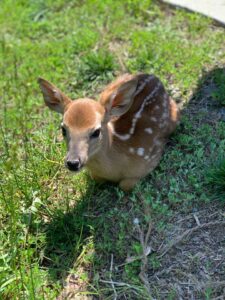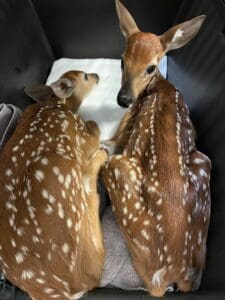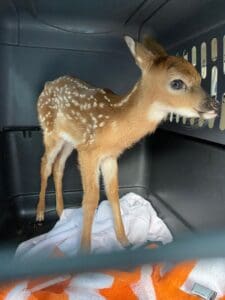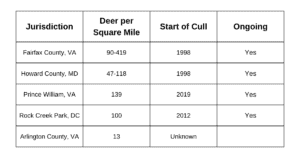Deer in Arlington County

White-tailed deer are native to Arlington County and an essential part of our local ecology. They enrich the soil and support native plant biodiversity, benefitting local bird, reptile, and mammal populations.
Unfortunately, deer in Arlington County are under threat.
- They face threats from natural predators such as coyotes and foxes and man-made hazards like high-privacy fencing, construction sites, and motor vehicles.
- Arlington County's inclusion in Chronic Wasting Disease Deer Management Area 2 prevents deer from being rehabilitated, necessitating the humane euthanization of orphaned fawns and mandatory testing of carcasses for human consumption.
- Human intervention, including proposed solutions like sharpshooting and archery.
- One of the most concerning threats is human intervention, Arlington County Parks and Recreation concluded that there are "too many deer" in Arlington County, based on a survey by Steward Green that counted 290 total deer in the County. AWLA acknowledges that the health of our forests and tree canopy is important to our local ecosystem, but believes that it would be best to find an approach that encompasses community safety, wildlife protection, and our forests' health. The four proposed management solutions are sharpshooting, archery, sterilization, and fencing. In a recent County engagement survey, Arlington County citizens overwhelmingly preferred that the County explore non-lethal methods of deer management.
Community preference and AWLA advocate for non-lethal approaches to deer population management prioritizing safety, wildlife protection, and forest health.
UPDATE September 10, 2024
AWLA is dedicated to providing humane and compassionate solutions to wildlife concerns, including issues related to our deer population. For the past few years, we have actively engaged in discussions with the County regarding their proposed deer management plan, advocating for non-lethal alternatives and highlighting the importance of coexisting with our local wildlife.
While we understand the County has decided to move forward with a sharpshooting program, a direction that differs from our consistent position, we remain deeply committed to our mission of protecting animals and wildlife. We recognize that the County’s decision is based on multiple factors, but we believe there are more humane ways to manage deer populations, and we do not support this cull.
In order to implement a deer cull in Arlington, the County code must be amended to allow professional sharpshooting in County-owned parks. Such changes require approval from the County Board, which is likely to consider the matter this fall and winter, according to the County’s timeline. AWLA is following this matter closely and will share updates and information with the community as appropriate.
We want to thank the Arlington community for your continued support throughout this process. Your voices have been invaluable in ensuring that wildlife issues are discussed with care and consideration. Moving forward, AWLA will continue advocating for wildlife protection and humane solutions to ecological challenges. Our work does not end here, and we will remain steadfast in our efforts to promote compassionate coexistence with all animals in Arlington County.
Together, we will achieve our vision of a humane community where wildlife and people live together harmoniously.
UPDATE July 8, 2024
Last month, Arlington County Parks and Recreation recommended establishing a sharpshooting program to reduce the deer population by culling. While the County’s deer project team has done a thorough job addressing this issue, the Animal Welfare League of Arlington disagrees with the project team’s recommendation to sharpshoot up to 125 deer in Arlington’s parks professionally [Parks and Recreation, Deer Management Project Online Engagement #2].
Our goal throughout this process has been to provide context and an additional perspective to an incredibly complex and controversial issue, knowing that reasonable minds can differ. To that end, AWLA firmly believes that sharpshooting 125 deer, which would account for over 40% of the latest deer population, is a disproportionate and excessive measure given the number of reported deer and the browsing levels in Arlington County.
- The County conducted a population survey of deer in 2021. In that original survey, 290 deer were counted in Arlington, at an average of 13 deer per square mile [Steward Green, 2021]. While some areas had higher concentrations of deer – near streams or forests, for example – the deer population levels in Arlington did not compare to other nearby jurisdictions that have instituted culls. Fairfax County, for instance, had an estimated 90-419 deer per square mile when they started their cull in 1998.
- The County’s report states that “moderate [deer browsing] impact was prevalent with fewer areas meeting the high and low impact criteria.” However, an overall “moderate” impact shouldn’t justify a 40% reduction in the deer population.
- Other factors from the most recent report suggest that deer levels are not substantially high. For example, deer-vehicle collisions and Lyme disease cases are both low. The County has also not provided any data indicating that deer in Arlington are currently unhealthy, which would suggest an out-of-balance population.
- It is important to note that there is already a natural population control on deer in Arlington County. Since the original survey, AWLA has picked up 122 deceased deer, and an additional 36 have been culled through hunting permits given by the Virginia Department of Wildlife Resources. Therefore, a minimum of 158 – 54.5% – deer have been statistically removed from Arlington County since 2021, indicating that deer populations do not remain unchecked.
Taken together, the data presented does not suggest that the deer levels in the County are at such a point that an immediate 40% reduction of deer is necessary. The level of deer and their impact is not uniform across the county, and there are other options worth pursuing. For example, White Buffalo, Inc., the County’s contractor in this process, suggested that a sterilization approach is a viable alternative, yet this was not recommended despite having the support of over 60% of the community.
We encourage our supporters to reach out to the County Board and ask that they consider alternative, less extreme measures that align more closely with the community's values and the overall data presented, ensuring a balanced and thoughtful approach to managing Arlington's deer population.
You can email the County Board your thoughts here, attend the the next Deer Management Project Virtual Community Meeting on July 11, or attend the next County Board Meeting on July 22nd.
AWLA's Goals
Create realistic benchmarks.
Thus far, the information presented by White Buffalo has no clear definition of “ecosystem health” nor are there estimates around the level of culling necessary to achieve the County's biodiversity goals. The latest figures shared by DPR suggest that Arlington would have to reduce its deer population by 90% to reach what has been deemed an acceptable carrying capacity. Questions that need to be asked:
- What are we trying to achieve and/or protect?
- How do we measure the success of implementation?
Create an action plan that utilizes a range of options for site-specific applications.
The number of deer and the impact they have is not uniform across the County. While AWLA acknowledges that the health of our forests and tree canopy is important to our local ecosystem, we believe in a more balanced approach; an approach that encompasses community safety, wildlife protection, AND the health of our forests.
Review what has worked in other communities.
Successful stewardship programs, such as Cincinnati, OH’s Clifton Deer Program* employ a public-private approach. This model enables academic collaboration and financial flexibility and utilizes field cameras, ear tagging, and radio collars for accurate monitoring and data collection.
Fairfax City's deer program* used sterilization techniques that were successful in reducing the deer population by approximately 20%.
*These programs operated under research permits held by White Buffalo, Inc., the contractor currently working with Arlington County.
How You Can Help
Contact The Arlington County Board
Let County Officials know how you feel about the proposed Deer Management Program.
Email the Board: countyboard@arlingtonva.us
More Information
Click on the topics below or scroll to learn more about Virginia White-Tailed Deer, AWLA's role in wildlife protection in Arlington County, and the County's deer management proposal.
Virginia White-Tailed Deer | AWLA's History of Wildlife Protection | Arlington County's Proposed Deer Management Project | Moving Forward | How You Can Help | Further Reading
Virginia White-Tailed Deer
Virginia White-Tailed Deer are the oldest species of deer in the world and have been in our area since long before Virginia was settled in the 1600s. By the 1900s, the over-harvest of deer for food and hides had almost eradicated the species, but since the 1930s, the species has rebounded thanks to protective game laws, restocking, and habitat restoration.
Deer live primarily in 'matrifocal' groups - a doe and her offspring - although they do sometimes graze in larger herds. Bucks (male deer) remain separate from these groups except during mating season. These groups, especially suburban deer, have 'site fidelity', typically spending their entire lives in a 1-2 sq mile range with their extended families.
AWLA's History of Wildlife Protection
AWLA's mission extends beyond companion animals and includes our wild neighbors. AWLA's wildlife program is one of the most respected in the country, and each year hundreds of wild animals come through our doors and are sent to licensed rehabilitators or are re-released back into the wild (wild animals that are too sick/injured to be released/rehabilitated are humanely euthanized). AWLA is the only agency in Arlington that provides these services to the community.
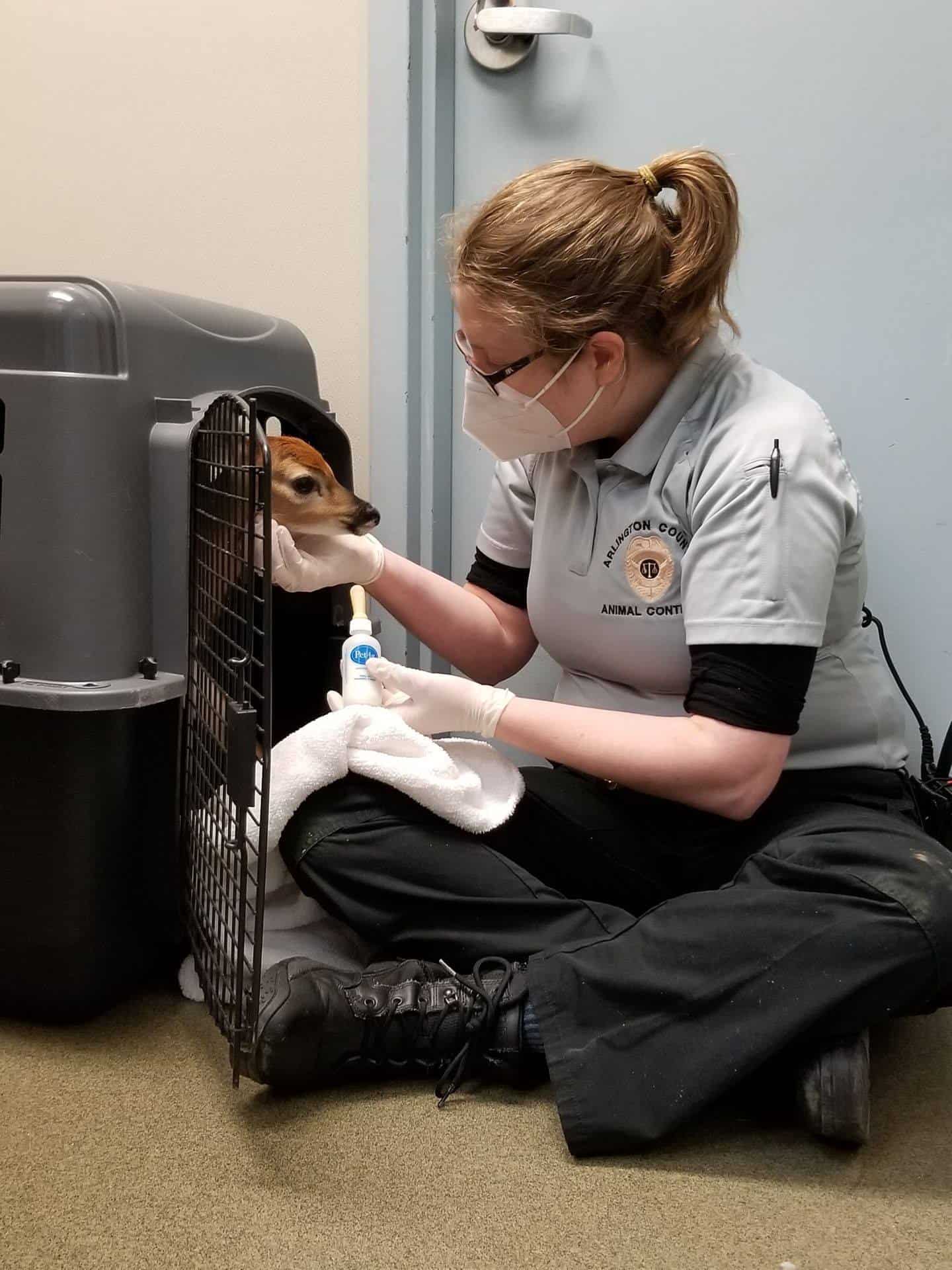
Each year, about 50% of calls to AWLA's Animal Control are wildlife-related. In 2023, just 180 of those calls, or approximately 9%, were deer-related. Wildlife in Arlington has - and is - being managed, with AWLA's Animal Control team working daily to uphold safety, ensure positive outcomes for critically injured and orphaned animals, and be responsive to community needs.
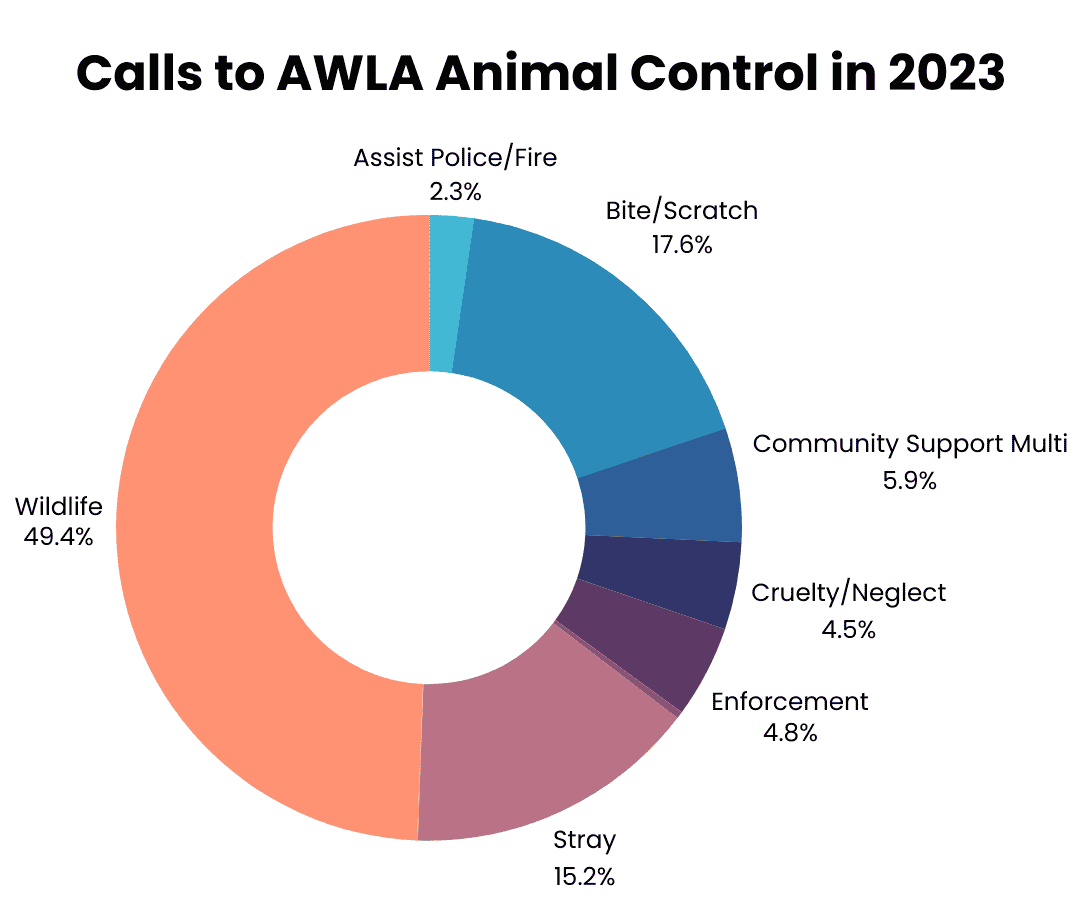
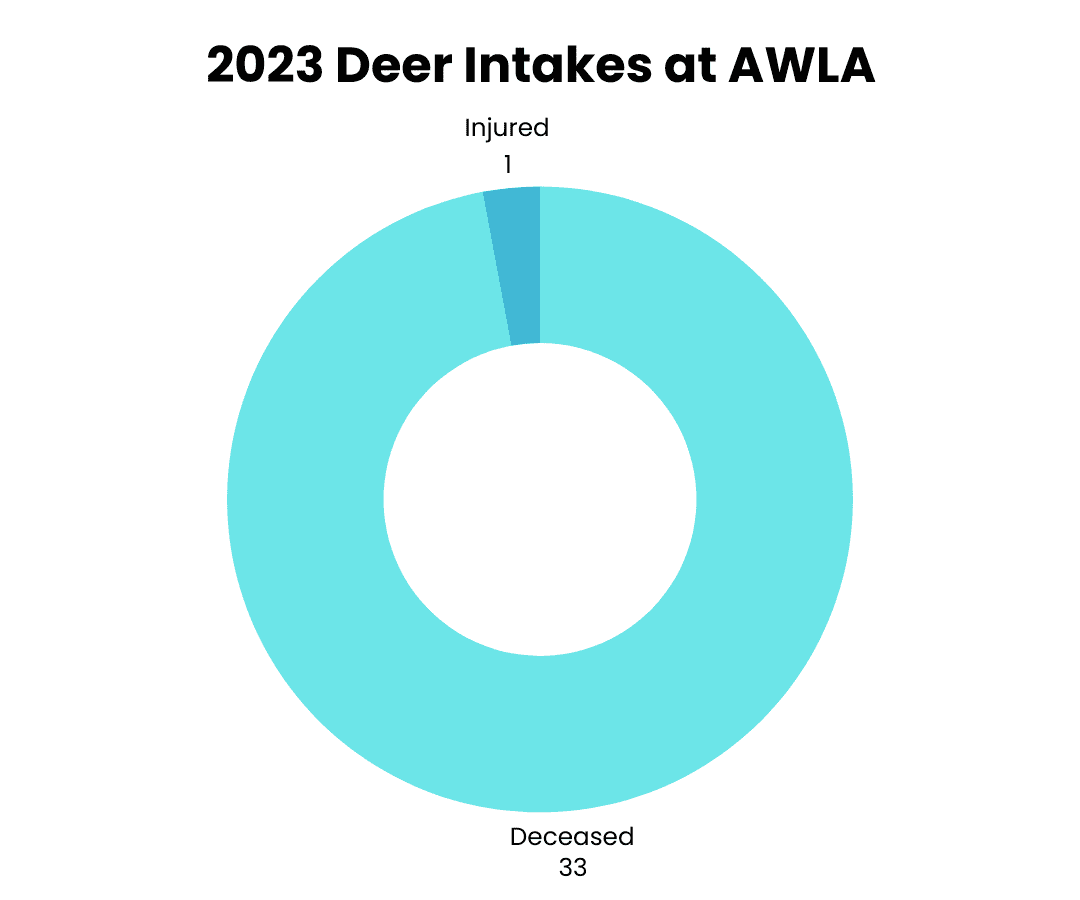
Click the arrows below to see just a few photos of our Animal Control officers and the wildlife they've helped!
Arlington Co's Proposed Deer Management Project
In 2021 Arlington County funded a deer survey to establish a count of our white-tailed deer population. The consultant, Steward Green, performed an aerial survey of deer which found 290 total deer in Arlington at an average of 13 deer per square mile. Still, even those higher-density areas had substantially less deer than other jurisdictions with culls. Fairfax County had an estimated 90-419 deer per square mile when they began culling in 1998.
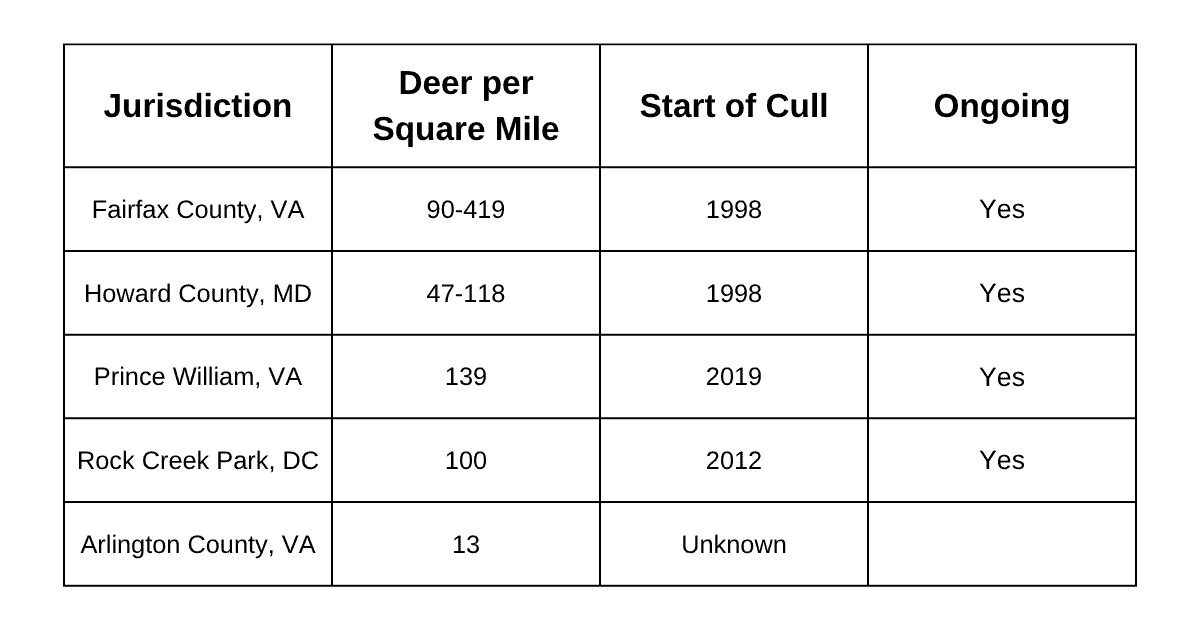
AWLA's Animal Control Dept has picked up 122 deceased deer since May 2021, and an additional 36 have been culled through hunting permits given by the Virginia Department of Wildlife Resources. Therefore, a minimum of 158 - 54.5% - deer have been statistically removed from Arlington County since the survey was published.
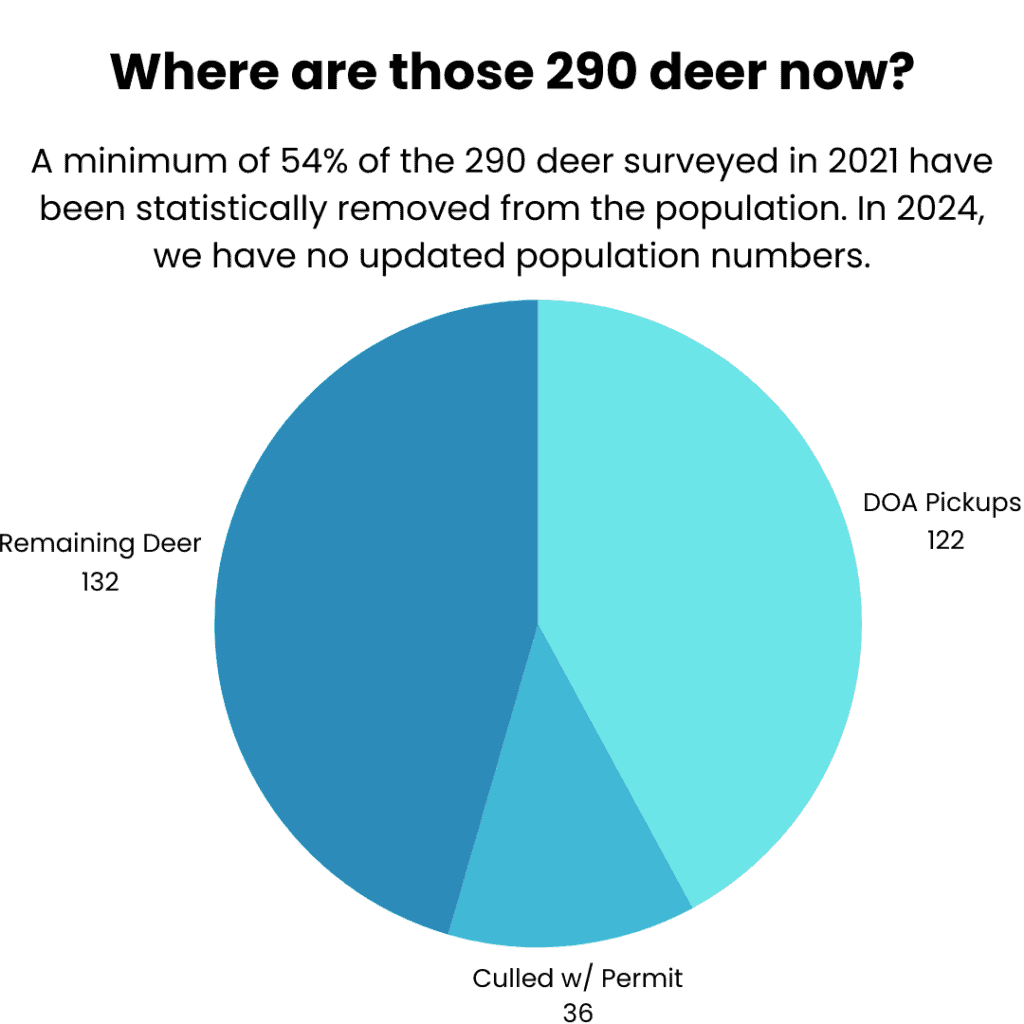
The survey suggests a sustainable level of 5-15 deer per square mile. This number, often referred to as “carrying capacity,” has no scientific basis (the report itself has studies citing different ranges, and the “5-15 deer per square mile” figure was not backed up with any specific citation). Some communities, and even areas within a community, will be able to sustain different numbers of deer based on multiple factors, like type and quality of food and cover.
White Buffalo's recommendation to the County has been to implement a deer management program, with four potential options of population control: sharpshooting, archery, sterilization, and fencing. In a recent County engagement survey, Arlington County citizens were overwhelmingly against sharpshooting and archery programs, preferring that the County explore non-lethal methods of deer management.
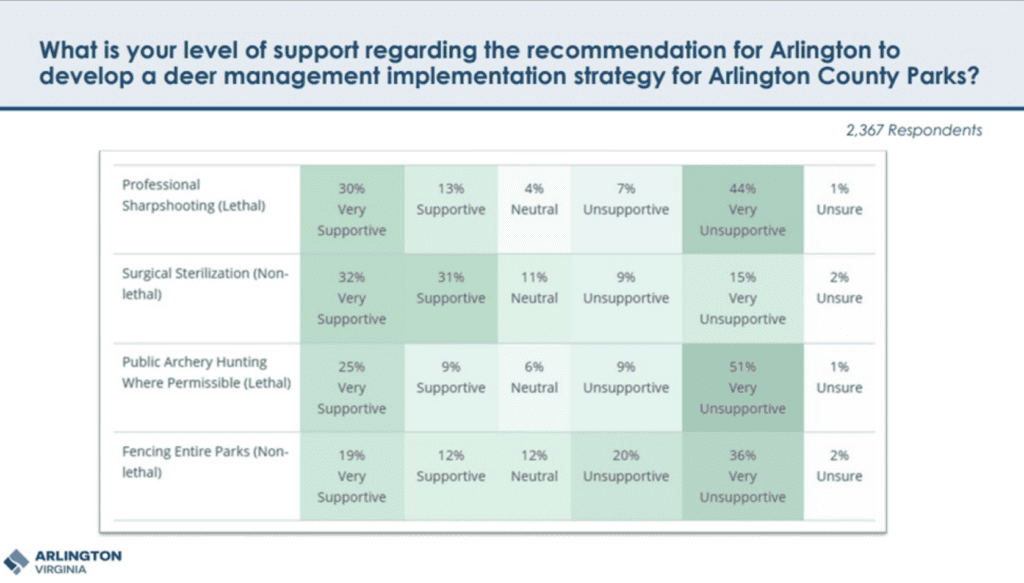
Earlier this year, Arlington County released the same numbers but changed the parameters, focusing their geographic areas to just 12 County parks. This included 97 deer over 0.593 square miles, for an average of 124 deer per square mile. However, 9 of those 12 parks have five or fewer deer, effectively stating that, according to the County, five deer (or less) are too many deer for certain parks.
Click the play button below to view an interactive map of the Arlington County Parks included in the survey, along with the number of deer found in each park. Click on the deer icons for park information.
Overbrowsing
Arlington County Parks and Recreation stated that “12 out of 12 parks showed damage from deer over-browsing,” and White Buffalo's report said, “Moderate browsing was observed at most sites, with some sites experiencing heavy browsing and a few with minor browsing." While it may be factually correct, in the broadest terms, to say that all 12 parks surveyed experienced some level of damage, the level of damage varies significantly from park to park, suggesting that is important to devise solutions specific to each location.


